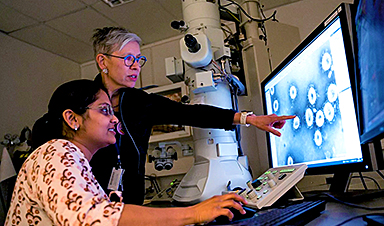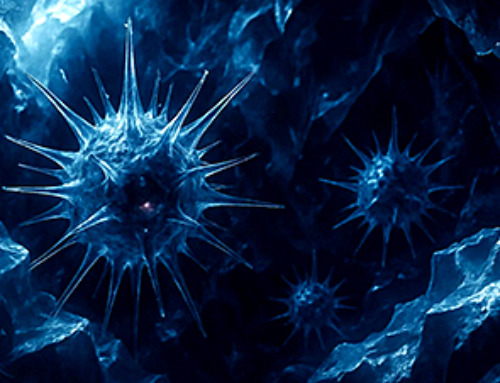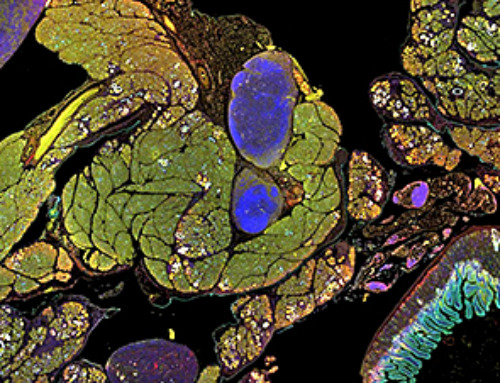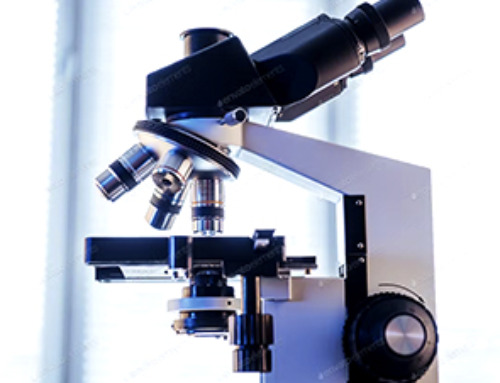Studies at the University of Jyväskylä in Finland show that resin-treated plastics can quickly deactivate viruses, part of a larger effort under the BIOPROT project to develop bio-based antiviral materials for protective gear.
Viruses can remain active on solid surfaces for extended periods, potentially raising the risk of infection. Professor Varpu Marjomäki, a Cell and Molecular Biology expert at the University of Jyväskylä, and her research team are exploring how various surfaces and materials can help reduce the transmission of viral diseases. Specifically, they are examining the survival duration of coronaviruses on different surfaces under varying conditions of humidity and temperature.
“This information would be of direct benefit to both consumers and industry. Antiviral functionality could be used, for example, in restaurants, kindergartens, public transport, and stores, on different surfaces, where viruses can potentially stay infective for a long time and spread easily,” says Professor Varpu Marjomäki from the University of Jyväskylä.
Plastic Surfaces With Antiviral Functionality
The researchers of the Nanoscience Center of the University of Jyväskylä studied resin-embedded plastic surfaces against both the seasonal human coronavirus and the SARS-CoV-2 virus.
“In our recent study, we found that the viruses stayed infective for more than two days on plastic surfaces that were not treated at all. In contrast, a plastic surface containing resin showed good antiviral activity within fifteen minutes of contact and excellent efficacy after thirty minutes. Plastic treated with resin is therefore a promising candidate for an antiviral surface,” says Marjomäki.
Research Cooperation Project With Premix Oy
The research is part of the BIOPROT project (Development of bio-based and antimicrobial materials and use as protective equipment) funded by Business Finland and has been done in collaboration with the Finnish company Premix Oy.
“The project aims to study existing and develop new antiviral solutions in cooperation with companies such as Premix Oy. This will help to create new products for future pandemics and epidemics,” says Marjomäki.
New Bio-Based and Antimicrobial Materials in Protective Equipment
The BIOPROT project involves a total of six universities and research institutes and several companies. The project is coordinated by LUT University and aims to develop new, sustainable and safe material solutions that will be used in the fight against infections, with a particular focus on respiratory and surgical mouth masks and reusable masks for industrial use. It is also hoped that the project will improve the self-sufficiency of products and materials in Europe. At the University of Jyväskylä, under the supervision of Marjomäki, the project is developing bio-based antiviral materials.
“Effective and nature-derived antivirals are available in Finland and could be used for the functionalization of masks and surfaces. Presently, there are only few bio-based functional solutions available, so we have an opportunity to be pioneers in this field,” says Marjomäki.
Reference: “Antiviral action of a functionalized plastic surface against human coronaviruses” by Sailee Shroff, Marjo Haapakoski, Kosti Tapio, Mira Laajala, Miika Leppänen, Zlatka Plavec, Antti Haapala, Sarah J. Butcher, Janne A. Ihalainen, J. Jussi Toppari and Varpu Marjomäki, 16 January 2024, Microbiology Spectrum.
DOI: 10.1128/spectrum.03008-23
News
Studies detail high rates of long COVID among healthcare, dental workers
Researchers have estimated approximately 8% of Americas have ever experienced long COVID, or lasting symptoms, following an acute COVID-19 infection. Now two recent international studies suggest that the percentage is much higher among healthcare workers [...]
Melting Arctic Ice May Unleash Ancient Deadly Diseases, Scientists Warn
Melting Arctic ice increases human and animal interactions, raising the risk of infectious disease spread. Researchers urge early intervention and surveillance. Climate change is opening new pathways for the spread of infectious diseases such [...]
Scientists May Have Found a Secret Weapon To Stop Pancreatic Cancer Before It Starts
Researchers at Cold Spring Harbor Laboratory have found that blocking the FGFR2 and EGFR genes can stop early-stage pancreatic cancer from progressing, offering a promising path toward prevention. Pancreatic cancer is expected to become [...]
Breakthrough Drug Restores Vision: Researchers Successfully Reverse Retinal Damage
Blocking the PROX1 protein allowed KAIST researchers to regenerate damaged retinas and restore vision in mice. Vision is one of the most important human senses, yet more than 300 million people around the world are at [...]
Differentiating cancerous and healthy cells through motion analysis
Researchers from Tokyo Metropolitan University have found that the motion of unlabeled cells can be used to tell whether they are cancerous or healthy. They observed malignant fibrosarcoma cells and [...]
This Tiny Cellular Gate Could Be the Key to Curing Cancer – And Regrowing Hair
After more than five decades of mystery, scientists have finally unveiled the detailed structure and function of a long-theorized molecular machine in our mitochondria — the mitochondrial pyruvate carrier. This microscopic gatekeeper controls how [...]
Unlocking Vision’s Secrets: Researchers Reveal 3D Structure of Key Eye Protein
Researchers have uncovered the 3D structure of RBP3, a key protein in vision, revealing how it transports retinoids and fatty acids and how its dysfunction may lead to retinal diseases. Proteins play a critical [...]
5 Key Facts About Nanoplastics and How They Affect the Human Body
Nanoplastics are typically defined as plastic particles smaller than 1000 nanometers. These particles are increasingly being detected in human tissues: they can bypass biological barriers, accumulate in organs, and may influence health in ways [...]
Measles Is Back: Doctors Warn of Dangerous Surge Across the U.S.
Parents are encouraged to contact their pediatrician if their child has been exposed to measles or is showing symptoms. Pediatric infectious disease experts are emphasizing the critical importance of measles vaccination, as the highly [...]
AI at the Speed of Light: How Silicon Photonics Are Reinventing Hardware
A cutting-edge AI acceleration platform powered by light rather than electricity could revolutionize how AI is trained and deployed. Using photonic integrated circuits made from advanced III-V semiconductors, researchers have developed a system that vastly [...]
A Grain of Brain, 523 Million Synapses, Most Complicated Neuroscience Experiment Ever Attempted
A team of over 150 scientists has achieved what once seemed impossible: a complete wiring and activity map of a tiny section of a mammalian brain. This feat, part of the MICrONS Project, rivals [...]
The Secret “Radar” Bacteria Use To Outsmart Their Enemies
A chemical radar allows bacteria to sense and eliminate predators. Investigating how microorganisms communicate deepens our understanding of the complex ecological interactions that shape our environment is an area of key focus for the [...]
Psychologists explore ethical issues associated with human-AI relationships
It's becoming increasingly commonplace for people to develop intimate, long-term relationships with artificial intelligence (AI) technologies. At their extreme, people have "married" their AI companions in non-legally binding ceremonies, and at least two people [...]
When You Lose Weight, Where Does It Actually Go?
Most health professionals lack a clear understanding of how body fat is lost, often subscribing to misconceptions like fat converting to energy or muscle. The truth is, fat is actually broken down into carbon [...]
How Everyday Plastics Quietly Turn Into DNA-Damaging Nanoparticles
The same unique structure that makes plastic so versatile also makes it susceptible to breaking down into harmful micro- and nanoscale particles. The world is saturated with trillions of microscopic and nanoscopic plastic particles, some smaller [...]
AI Outperforms Physicians in Real-World Urgent Care Decisions, Study Finds
The study, conducted at the virtual urgent care clinic Cedars-Sinai Connect in LA, compared recommendations given in about 500 visits of adult patients with relatively common symptoms – respiratory, urinary, eye, vaginal and dental. [...]





















